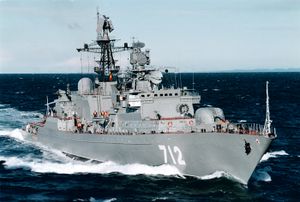Aberso–Illyrian War
| Aberso-Illyrian War | |||||||||
|---|---|---|---|---|---|---|---|---|---|
| Part of Anti-Communist Wars of the 21 Century | |||||||||
 A New Illyrian frigate sailing out from Andrafolia to fight in the Second Battle of the Claufenese Sea | |||||||||
| |||||||||
| Belligerents | |||||||||
| |||||||||
| Commanders and leaders | |||||||||
|
|
| ||||||||
| Strength | |||||||||
|
| ||||||||
The Aberso–Illyrian War (Illyrian Iberic: Gero de Aersaenae et Novo Elyreco, Abersianian: Aberso-Illyrische oorlog) was a month long military conflict between New Illyricum and Abersiania in the Andaluzian Sea, which began on September 23 and which concluded on October 25, 2023. Abersiania was also joined by allies Kivu, Jackson and Baltanla, while Montcrabe and Pavulturilor also declared war separately. Tensions sparked after political disagreements began shortly after the gestation of the OU military intervention in Akvatika, as while Abersiania was a vocal ally of the Ostlandet Union (OU), New Illyricum supported Zloveshchiy, the nation which the OU was invading.
Contents
Prelude
On August 20, 2023, Tumish President Griffin Airhourser and the Congress of New Illyricum agreed to one of the largest oil agreements in the history of Terraconserva, with Tumland agreeing to transport over 210,000 barrels of oil to Porto Enateo in exchange for 32,760,000 Gregoris. Traveling through the tension filled Romanyan Sea, New Illyricum deployed a flotilla from their fleet to convoy the Tumish oil tankers. The tankers successfully unloaded their oil onto Illyrian soil on September 3. The Government of Tumland faced heavy scrutiny, primarily from two major Alliance of Central Ecrosian States (ACES) powers, Kivu and Jackson, about trading with a communist country, however Airhourser did not address these concerns. Even after the fulfillment of the oil agreement, Tumish-Illyrian trading continued.
One of Tumland's other largest trade partners, the island nation of Abersiania, was wary of the trading ships that sailed near, and in some cases through, Abersianian waters, and deployed ships to defend the Claufenese Sea, their naval border with New Illyricum. Illyrian-Abersianian tensions continued to mount after the Prime Minister of Abersiania, Jeremy Hausch, accused New Illyricum of having a tyrannical government, to which the Government of New Illyricum responded by heavily increasing naval patrols and banning travel to Abersiania.
On September 17 tensions between Abersiania and New Illyricum took turn when a Tumish trading ship heading to Porto Enateo carrying oil blew off course into Abersianian waters and was seized by the SSH Schoefengen at 07:17, KMT, in a dense fog. The ship was held for about 3 hours before the Tumish ship and it's cargo were escorted back to Tumland. In order to prevent a similar incident, Illyrian ships were deployed to defend shipping lanes along the Apollonian coast and too enforce New Illyricum's claim on the Claufenese Sea. In response, Jeremy Hausch, the Prime Minister of Abersiania, ordered Abersianian ships and planes to begin constant patrolling of the Claufenese Sea. Tensions came to a head on September 22, when the SSH Schoefengen came to a standoff against the NIS Andrafolia in the Claufenese Sea. Illyrian Captain Lucius Germinius was ordered by the New Illyrian Naval Command to alert Captain Henrich Flagten and the Abersianian Navy of a 24 hour ultimatum to withdraw or face military action.
Order of battle
Abersiania
New Illyricum
Course of war
Second Battle of the Claufenese Sea
At 01:00 on September 23, a series of military dispatches were sent out by the Illyrian Naval Command, which commanded the 106th Fighter Division, under the command of Colonel Marcus Kalendus, to prepare to engage the Abersianian Air Force. Abersianian Captain Henrich Flagten called for the pulling out of all Abersianian reserve ships and planes in order to defeat the New Illyrian fleet, which was larger strictly based on number of ships. As time winded down on the 24 hour ultimatum, repeated attempts were made by both sides to convince the other to withdraw, however both sides remained steadfast in their refusal to withdraw from the Claufenese Sea. At 21:55 communications between Abersiania and New Illyricum were cut short, and at 22:00 the ultimatum expired, and the NIS Andrafolia opened fire. Heavy combat continued until about 02:00 on September 24, when the Abersianian force had clearly gained air and by extension naval superiority. At 02:53 New Illyrian Admiral Mario Antinus issued the order for the Illyrian ships to withdraw to friendly waters, and the final shots of the battle were fired at about 03:07.
Pretoria Palace Summit
Only an hour after combat in the Claufenese Sea began, the government of Tirol, a neutral country, extended an offer to the Abersianian and Illyrian ambassadors in the city of Innsbruck, offering to be a neutral third party to mediate negotiations to end the conflict. The Government of Tirol also invited delegates from Kivu, Jackson, and Eleutherios to represent the interests of ACES, and appointed Uorsin Sante as mediator for the negotiations. All four countries agreed to send delegates to Pretoria Palace to negotiate in the coming days, and after a day, negotiations started on the 25th of September. The main focuses of the negotiations were the status of militarisation in the Claufenese Sea, introduction of free and fair elections to the governing system of New Illyricum and a protection guarantee, as tensions between New Illyricum and CODECO, especially Pavulturilor.
On October 24, the Central Ecrosian Council officially announced their ratification of the preposed Pretoria Peace Accords after a week of deliberation and editing. After another day of debate, the Congress of New Illyricum held a final vote on whether to ratify the propose treaty or not, and ultimately the treaty was ratified on October 25 by a vote of 102-97. The next day the treaty was officially signed in Innsbruck, ending the war.
Assassination of Jeremy Hausch and 2023 Abersianian election
On October 1, Jeremy Hausch appeared in Schoefengen to make a speech on the recent Surrender of the Zloveshchiyan Forces on Akvatika and about the ongoing Pretoria Palace Summit. Shortly after beginning the announcement outside of the Schoefengen Press Building an armed gunman, Jacob Klerkse, entered the Meeuwis Hotel, which lay across the square, and proceeded to the roof. Midway through his speech, Hausch was shot in the right lung and collapsed. Immediately emergency services were called, and the crowd dispersed for fear of another shot, however Hausch would die four hours later in Schoefengen General Hospital. The Iberic Communist League, a terrorist extremist group operating in Abersiania, took official responsibility for the murder. Two days after Hausch's death, the Congress of New Illyricum convened and officially condemned the Iberic Communist League, a tactical political move meant to help the Pretoria Peace Summit negotiations move along. However ultimately the assassination proved to be fruitless for the communist cause, as Liberaulsh Party delegate David Schaunesten won the 2023 Abersianian Election on October 6, and he has continued in Hausch's steps so far throughout his short time as Prime Minister.
Protests
With the peace negotiations continuing, many pro-war extremist groups, notably the Peoples' Global Communist Unification Coalition (PGCUC), in New Illyricum took to the streets in protest beginning on September 28. Tensions continued to heighten, and the protests highlighted the large religious and political divisions within the country as in several cities the protests turned violent. After Marshall of Congress Marius Montus announced the condemnation of the assassins of Jeremy Hausch, many Illyrian communist groups began large scale riots, especially in the city of Trurnia. On October 12 in Trurnia, three bombs exploded in St. Gregorius' Cathedral killing 236 and injuring over 100 more. That same night massive riots began in the streets of the city, with rioters chanting "Nihil Pax!" (No Peace) and "Interfece Uorsin Sante!" (Kill Uorsin Sante). Uorsin Sante had become the symbol of the peace movement in New Illyricum, which made him a major target to groups like the PGCUC who were pushing for the continuation of war. At 21:30 on October 12 Marshall of Trurnia Lucius Marius Fortis declared the city to be on lockdown and authorized the use of deadly force in dispersing the rioters. Since the October 12 riots, there have been several major protests, however no major riots has broken out since then. The New Illyrian government failed to make a statement, which to many citizens showed its ineptitude and large scale inability to find a compromise. Trurnia is still on lockdown as of October 24, 2023.
